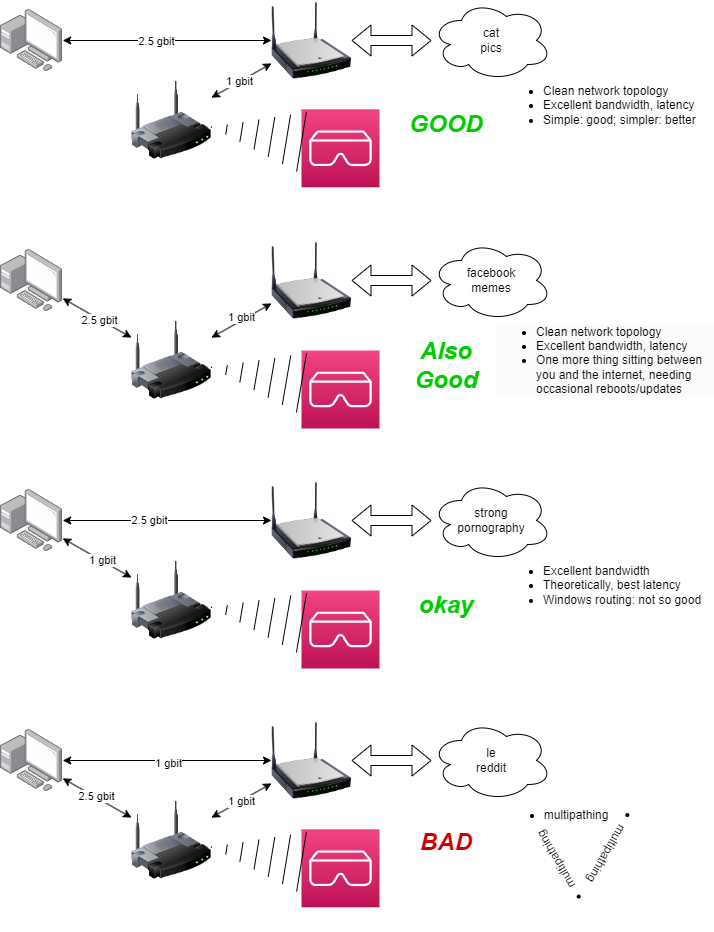atarumoroboshi18
Limp Gawd
- Joined
- Nov 9, 2013
- Messages
- 286
Just throwing this out there. To anyone who is currently playing with Wireless VR, what is the router you would recommend for this task?
Follow along with the video below to see how to install our site as a web app on your home screen.
Note: This feature may not be available in some browsers.
I have the Pico 4 and I'm trying to get the most stable connection possible for my situation. I'm getting a ASUS RT-AX55 (AX1800) as that was one of the recommended ones for the Pico 4.What headset do you have?
I'm currently using a TP Link Archer AX10 which works pretty well for both my Quest 2 and Quest Pro. It has wifi 6 but only 5 ghz signal But it's also dedicated only to VR and very close to where I play. It doesn't work well if I'm far away from it. It was super cheap, actually cheaper than the official link cable.
I'm getting the ASUS ZenWiFi Pro ET12 soon, which does wifi 6e with with a 6ghz signal which the Quest Pro can use, Q2 cannot do 6ghz. I'm not sure how much better it will work, but I'm not getting it just for VR either.
I haven't seen any good sites/videos for routers and VR. The best router reviews for routers I've seen are from this guy on youtube https://www.youtube.com/@landpet that just tests them with his phone.
I have the Pico 4 and I'm trying to get the most stable connection possible for my situation. I'm getting a ASUS RT-AX55 (AX1800) as that was one of the recommended ones for the Pico 4.
Yes. The Pico 4 I use is purely for Virtual Desktop. This router will be solely for powering the wireless function of the headset and will be the only device to connect to it.The Pico 4 can only do wifi 6 so that should be good. I like Asus the best for routers, they just tend to cost more. Are you using Virtual Desktop to connect?
I have a Quest 2 with the Asus RT-AX55 and that works perfect with VD on HEVC10 at 150. Dedicated of course, best way to get a near stutter less experience.Yes. The Pico 4 I use is purely for Virtual Desktop. This router will be solely for powering the wireless function of the headset and will be the only device to connect to it.
This reads kind of like your computer, internet router, and VR router are all connected to each other in a big circle. That would be bad, because consumer gear is not good at handling multi-pathing.Yeah that would help, wouldn't it?
PC Specs:
5800x3D
Gigabyte Gaming OC 4090 GPU
2x16GB Corsair Vengeance RAM
ASUS ROG Crosshair VIII Dark Hero
Router:
ASUS RT-AX55
Connected directly to both my main router and my PC via Cat6 cables.
Using long Cat6 cables(20ft lengths) I've moved the router into a close by empty room strictly for VR away from other signals.
All the best options exclusively for Wifi 6, such as 80hz channel width, AX only, etc.
Disabled the 2.4ghz band on this router as it will only be for the Pico 4.
VD Specs:
H.264+ at 200Mbps
90Fps
Buffering - On
Godlike
Edit:
Oh yeah, the AX55 router is connected to my router, but it's also connected to the 2.5Gb ethernet port on my Mobo to ensure it gets the maximum connection speed.

This is accurate. Friends don't let friends double NAT.There shouldn't be more than one router on a home network anyway, outside of crazy homelab setups with multiple L3 switches on different subnets.